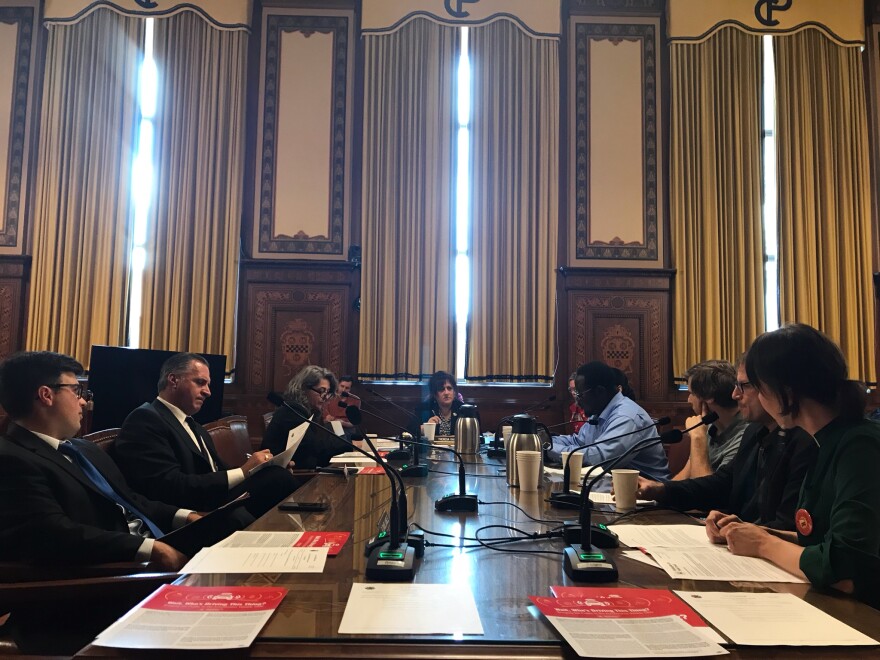In recent months, more and more people connected to the world of self-driving cars have tempered expectations about their future.
While the technology has come a long way, teaching machines how to handle all the wild stuff humans do on the road is going to take awhile, Argo AI’s Bryan Salesky told the New York Times.
When the time comes, self-driving cars could change the world, but Pittsburgh residents and officials have only just begun to talk together about how they may change the city. A discussion between council members and experts this week revealed the yawning divide between technological advances and public policy.
On Tuesday, a panel of experts explained how autonomous vehicles may affect air quality, the way streets are designed, or where people live, and then they took questions.
The tone was reminiscent of the congressional hearings with Facebook's Mark Zuckerberg last year, when Republican Senator Orrin Hatch of Utah notoriously asked the wunderkind how his company sustained “a business model in which users don’t pay for your service?” Zuckerburg responded with "Senator, we sell ads."

But like Facebook’s operations, autonomous vehicles are complicated, and legislators aren’t technologists. That policy lags behind the latest advancements is thus far the way of the world, but a lack of knowledge didn’t keep city officials from embracing self-driving technology.
Companies have tested autonomous vehicles in Pittsburgh since 2016. In September of that year, Mayor Bill Peduto tweeted an image of himself smiling in the backseat of the “first ordered autonomous vehicle ride.” But the initial gung-ho endorsement soured over questions of what the company owed the city. Peduto said the company should offer benefits to all of its drivers, should have supported its bid for the U.S. Department of Transportation’s Smart Cities grant, and should share its data. (For this story, an Uber spokesperson said the company has worked hard to create anonymized, aggregated data sets from which the city can gain valuable insight about how people move).
The first ordered autonomous @Uber ride in Pittsburgh w @CarnegieMellon President Suresh pic.twitter.com/HGhEBbO75e
— bill peduto (@billpeduto) September 14, 2016
After a 2018 fatality in Arizona, Uber halted testing in Pittsburgh. Meanwhile, the number of self-driving outfits here quietly grew to five. Despite public misgivings about how autonomous vehicles used city streets, Peduto said last year that autonomous vehicles are inevitable.
“Every company in the world is moving to shared, electric, autonomous and connected vehicles,” he said.
For some residents, that future feels imminent. In its Mon-Oakland Mobility Plan, the city has floated a system of autonomous micro-shuttles as a way to directly connect Oakland with Greenfield and Hazelwood via Schenley Park.
A small group of residents gathered on the steps of the City County building this spring to protest such a system. Ziggy Edwards, who lives in the lower part of Greenfield known as the Run, worried the city was more interested in being on the cutting edge of technology than serving residents.
“They seem very determined to do what they originally wanted and not really, seriously consider any other alternative,” she said.
The Mon-Oakland project would initially affect only a small segment of Pittsburgh’s population, but the policy implications could eventually affect thousands, and that raises a lot of questions. What kinds of data will such a system collect? Who will be able to afford on-demand transit? Will people with disabilities be able to use it? How many bus drivers lose their jobs? Will people use commute time to sleep or catch up on email? Will they live in Erie and commute to Pittsburgh? What would that mean for the city’s tax base?
Pittsburgh’s Department of Mobility and Infrastructure finally has the resources to engage deeply with the public on these very issues, said director Karina Ricks. In May, the Knight Foundation awarded $410,539 to the city over three years to help “demystify” autonomous vehicle technology for the public. Ricks said the department will hire a coordinator to organize discussions and conversations to help inform city policy.
As far as autonomous shuttles and the Mon-Oakland plan go, Ricks said they got ahead of themselves: while a shuttle is still a possibility, it would be commanded by a human.
“Today, in 2019, and likely in 2020 and 2023 and 2027, there is no such thing as an autonomous shuttle,” she said this week. “The technology is not there yet.”
Companies here are on a hiring tear, but representatives from Argo AI, Aurora and Uber all echoed the idea that the technology isn’t ready yet for wide-spread deployment.
Kevin Kerr of Uber said the company’s focus is entirely on safety.
“We want to be sure we’re doing this right,” he said. He added that self-driving cars will not provide the answer for every problem. “We see this as a shared system of mobility.”
Driverless technology will be a net benefit to society, and prevent millions of car crashes, said Aurora CEO Chris Urmson. Since 2000, more than 624,000 people have died in car crashes. The Washington Post reported that number is greater than the American military personnel killed during WWI and WWII combined.
“We’re not a company that is about building technology for technology’s sake,” Urmson said. “It’s about building this transformational technology, doing that safely, and working with the community.”
Advocates, companies, and city officials all say there’s so much yet to be worked out. Pittsburgh still has time to do so, but no time to waste.




